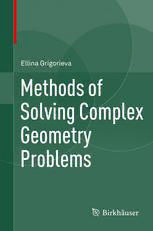
Methods of Solving Complex Geometry Problems PDF
Preview Methods of Solving Complex Geometry Problems
Ellina Grigorieva Methods of Solving Complex Geometry Problems Ellina Grigorieva Methods of Solving Complex Geometry Problems EllinaGrigorieva MathematicsandComputerScience TexasWoman’sUniversity Denton,TX,USA ISBN978-3-319-00704-5 ISBN978-3-319-00705-2(eBook) DOI10.1007/978-3-319-00705-2 SpringerChamHeidelbergNewYorkDordrechtLondon LibraryofCongressControlNumber:2013943010 MathematicsSubjectClassification(2010):97G40,97D50,68T20,51N20 ©SpringerInternationalPublishingSwitzerland2013 Thisworkissubjecttocopyright.AllrightsarereservedbythePublisher,whetherthewholeorpart of the material is concerned, specifically the rights of translation, reprinting, reuse of illustrations, recitation,broadcasting,reproductiononmicrofilmsorinanyotherphysicalway,andtransmissionor informationstorageandretrieval,electronicadaptation,computersoftware,orbysimilarordissimilar methodologynowknownorhereafterdeveloped.Exemptedfromthislegalreservationarebriefexcerpts inconnectionwithreviewsorscholarlyanalysisormaterialsuppliedspecificallyforthepurposeofbeing enteredandexecutedonacomputersystem,forexclusiveusebythepurchaserofthework.Duplication ofthispublicationorpartsthereofispermittedonlyundertheprovisionsoftheCopyrightLawofthe Publisher’s location, in its current version, and permission for use must always be obtained from Springer.PermissionsforusemaybeobtainedthroughRightsLinkattheCopyrightClearanceCenter. ViolationsareliabletoprosecutionundertherespectiveCopyrightLaw. The use of general descriptive names, registered names, trademarks, service marks, etc. in this publicationdoesnotimply,evenintheabsenceofaspecificstatement,thatsuchnamesareexempt fromtherelevantprotectivelawsandregulationsandthereforefreeforgeneraluse. While the advice and information in this book are believed to be true and accurate at the date of publication,neithertheauthorsnortheeditorsnorthepublishercanacceptanylegalresponsibilityfor anyerrorsoromissionsthatmaybemade.Thepublishermakesnowarranty,expressorimplied,with respecttothematerialcontainedherein. Printedonacid-freepaper SpringerispartofSpringerScience+BusinessMedia(www.birkhauser-science.com) To my beautiful daughter, Sasha And to my wonderful parents, Natali and Valery Grigoriev Your encouragement made this book possible And to my university mentor and scientific advisor academician, Stepanov Nikolay Fedorovich Without your help and brilliant mind my career as a scientist would not have been successful! Preface Many of us fear mathematics. Sometimes we live with this fear all our lives. We assume that math is not for us and believe that our next-door neighbor is a genius just because he or she is a math major. When I was young, I trained professionally as a musician. One day in the sixth grade after missing 2 weeks of schoolandcomingbackfromanationalviolincompetition,Ididnotdowellona planegeometrytestbecauseIcouldnotunderstandhowtodoproofs.Ireceiveda B(cid:1)onthetest—agreatdisappointment.Iaskedtheteacherwhy.Mymathteacher told me, in front of the class, that I had no talent for the subject and that I should continuepracticingtheviolin.Now,beingateachermyself,Iunderstandthatthis approach was not the best pedagogical “trick” that can be applied in a classroom. However, it worked in my case and it motivated me. I went home and worked until I could solve all the problems in the book. It is important to mention that before I was publicly criticized by my math teacher I did not realize that my understanding of the subject was not clear. I remember sitting in the back of the classandwatchinghowotherstudentswenttotheboardtoperformproofs.Ihadno ideahowtheydidit. Iwasalwaysgoodinalgebrabutgeometrywasdifferent.Geometrywasnotjust thecalculationofsomethingortheapplicationofaformula.Ingeometryclasswe hadtodoproofsusingEuclideanpostulatesandaxioms.Ihadneverdonesuchthings before.ItwasevenmoreshockingformesinceImissedthefirsttwoweeksofthe subject.Ididnotknowhowtoevenstartaproof.IhatedgeometryasstronglyasI hatedplayingviolininthefirstgradewhennothingwasgoodenoughformyteacher. ThatteacherdidnotwanttoworkwithmeanymorebecauseshealsobelievedthatI didnothavetalentfortheviolinandsentmehomecrying.Iwassevenyearsoldand didnotliketheviolinuntilIgotanewviolinteacher,Mr.London.Hewasableto givemehopeanddevelopedmyskillssoIbecamethebestinmyviolinclass.Idid notlikegeometryinthesameway.IdidnotunderstanditandIdidnotlikeit.But, when I made an effort and solved every problem in the book I started to love the subject.Wealwayslikethingsthatwearegoodatorthethingsthatcomeeasy.We love something if we have visible, continuous success. Such success comes only withhardwork.IlaterwentontowinvariousMathOlympiadsandgraduatefrom vii viii Preface Lomonosov Moscow State University (MGU) summa cum laude, defend a Ph.D. inMathematicaland Physical Sciences, and publish over 60papers inthe field of differentialequations,gametheory,economics,andoptimalcontroltheory. AtMoscowState,attheendofeachsemesterthestudentshadtopassfouroral examsgivenbyrenownedprofessors.Theprofessorscouldaskanytrickyquestions onthetopicoftheexaminationticket.WhenIwaspreparingforsuchexamsandin order to have an “A,”I did nottry to memorize allthe definitions and proofs,but rather I tried to develop a “global” understanding of the subject. I thought of possible questions that an examiner could ask me and tried to predict the type ofaproblemthatIcouldbeaskedtosolve.Idevelopedmyownwayoflearningand Iwanttoshareitwithyou.Ifyouarestrugglingwithmath,thisbookisforyou. Forover30yearswheneverIspottedanespeciallyinterestingortrickyproblem, I added it to my notebooks along with my original solutions. I’ve accumulated thousands of these problems. I use them every day in my teaching and included manyoftheminthisbook.Pleaselookatoneofmynotebookpagesfromtheninth grade in the Appendix. You will see how carefully and neatly each problem was presented and solved. Please notice the importance of making an accurate sketch. Many of the problems were created when I was an assistant professor and also worked as a tutor to prepare high school students for the MGU entrance exams. Before accepting an academic position at a university, I worked as a teacher at Ursuline Academy of Dallas and used my problem-solving techniques in my students’ college preparation. I was pleased to receive appreciation letters from MITandHarvardwheresomeofmystudentswereadmitted. If students see an elegant solution but do not apply the approach to other problems, they will not remember it just as nobody remembers phone numbers thesedays.However,ifateacherusesandreusesthesameapproachthroughoutthe entire curriculum, students will remember it and learn to value the beauty of the method. Most math books start from theoretical facts, give one or two examples, and then a set of problems. In this book almost every statement is followed by problems. You are not just memorizing a theorem; you apply the knowledge immediately.Uponseeingasimilarprobleminthehomeworksectionyouwillbe abletorecognizeandsolveit. Although each section of this book can be studied independently, this book is constructed to reinforce patterns developed at stages throughout this book. This helps you to see how math topics are connected. This book can be helpful for self-education, for people who want to do well in math classes or to prepare forcompetitions.Thisbookisalsomeantformathteachersandcollegeprofessors whowouldliketouseitasanextraresourceintheirclassroom. Preface ix What Is This Book About? Geometry is a very important field of mathematics with applications in science, architecture,andart.Itisdifficulttofindafieldofhumanactivitywheregeometry is not applied. People build houses and office buildings, roads, and airplanes. Geometry is everywhere. Even if you are not going to become a scientist or engineer and wish only to graduate from a university, without knowledge of geometryyoumaynotpasstheSAT. Geometryisprobablytheoldestpartofmathematics.Ancientpeoplewantedto know how big their property was, its capacity for growing crops, and how much fencewasneeded.Aroundthattimesimplegeometricfigureswereintroducedsuch astriangles,squares,andcircles.ProblemssolvedbyancientGreeksandEgyptians areveryunusualandchallengingandtheirdifferentversionsappearonsomeexams andmathcontests.ReviewingoverlookedproblemsandtheirsolutionsthatIoffer in this book can prepare you for solving Math Olympiad problems. Few teachers cover such problems. Some teachers do not have time to explain a strategy for solving these problems; others do not have the background. This book is not a textbook.Thisbookdoesnotcovereverytopicingeometry,butitwillprovideyou with a brief course in plane geometry and it will help you to develop problem- solvingskills.Itwillhelpyoutoimproveyourmathematicalabilities. This book is briefly divided into four chapters: Triangle, Quadrilaterals and Polygons,Circles,andProblemsonConstruction.Eachchapterhasitsownhome- work. However, there are overlaps between chapters, because, for example, a problem on a triangle and a circle inscribed into it cannot be solved without knowledgeofthepropertiesofeach.Sometimesforthesamereason,inasolution orproofwewilluseaproperty(lemmaortheorem)proveninalatersection.Soif youknowthatpropertyyoucanfollowalongrightawayand,ifnot,thenyoumay finditinthefollowingsectionsorinthesuggestedreferences. It is obvious that two distinct points form a unique line. How do you find out whetherornotthreegivenpointsareonthesameline(collinear)?Itiswellknown (but youwilllearn how toprove it)thatthree mediansandthreealtitudesconcur. WhatifwetakesomepointsM,N,andKonthesidesofatriangleandconnectthem withthecorrespondingoppositevertex?Underwhatconditionwillsuchsegments (cevians) intersect at one point (concur)? The answer to these and many other questionswillbefoundinthisbook.Thisbookcontainsimportantandsometimes overlooked topics on triangles, quadrilaterals, and circles such as Menelaus-Ceva theorems, Simson line, theorems of the three altitudes and medians, and Heron’s formulaalongwiththeirproofs.YouwillbeabletodissectasegmentintheGolden ratio, construct an angle of 36(cid:3), and visualize Fibonacci numbers. You will prove the inequality between geometric, arithmetic, and harmonic means in a purely geometricway:thewayitwasdone1000yearsagobyancientGreeks,andprove whynoteveryanglecanbetrisectedusingmodernmethods.Youwilllearnwhich quadrilateral with diagonals d and d has the maximum area and solve unusual 1 2
